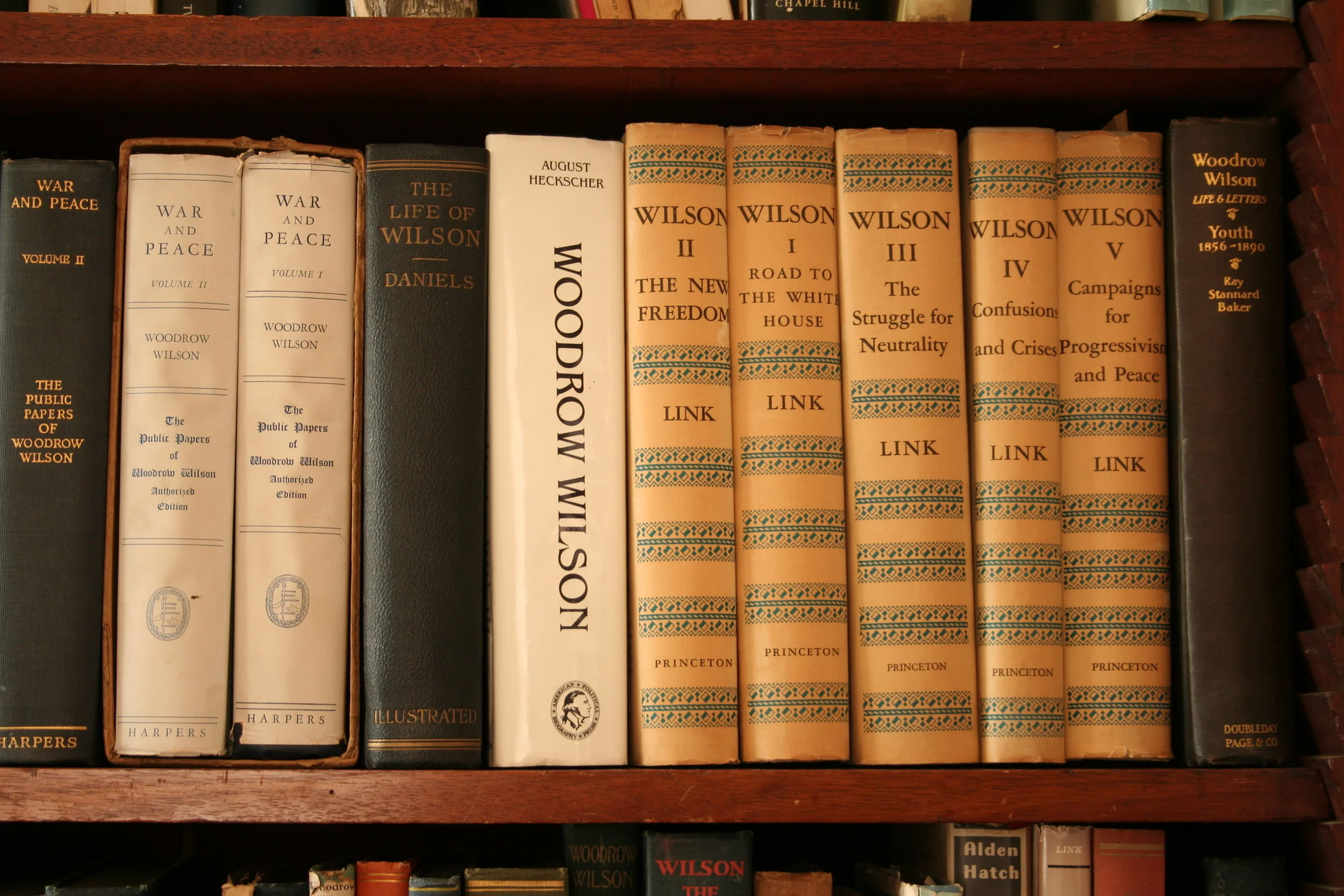Woodrow Wilson, Student
/In 1870, Woodrow Wilson’s father, Joseph, moved the family from Augusta, Georgia to Columbia, South Carolina to start a new job as a theology professor and preacher. Woodrow, about to turn fourteen, spent a few years studying with several local tutors in town. While still a slow reader, he threw himself into academic work for the first time, immersing himself in literature, theology, and history.
The church in Columbia did not appreciate Joseph Wilson’s sermons, so he moved the family to Wilmington, North Carolina to be a pastor, but his two daughters were both in the process of getting married around this time. Meanwhile, Woodrow spent that summer preparing to go off to college at Davidson College, where the sons of ministers could attend without paying tuition.
Course at Davidson College North Carolina.
Freshman Year. First Term. 1873
Bible,—Old Testament History, Chronology, and Geography.
English.—Fowler’s Grammar.
Latin.—Gildersleeve’s Grammar; Cicero de Senectute (C & S); Gildersleeve’s Exercise book, Course 1st.
Greek.—Hadley’s Grammar, throughout course Xenophon’s Anabasis, books III and IV (Owen); Composition.
Mathematics.—Towne’s Algebra.
Second Term.
Bible.—See first term.
English.—Trench on the Study of Words; Harts Composition and Rhetoric, to chapter IV.
Latin.—Cicero de Amicitia (C. S.); Satires & Epistles of Horace (C & S); Composition, II.
Greek.—Xenophon’s Memorabilia (Robbin’s); Herodotus (Johnson); Composition.
Mathematics.—Algebra; Pierce’s Geometry.
Woodrow Wilson Papers, vol. 1, pp. 26-27.
Young Wilson had to catch up in mathematics, Greek, and Latin, but he did well in college as a sixteen-year-old student. He joined the Eumenean Literary Society and became its secretary, while also taking part in debates there. However, he seems to have suffered from poor health by the end of the second semester, and, with the encouragement of his mother, decided to join the family at their new home in Wilmington for a year of recuperation. He did not lounge around though. With the help of a tutor, he worked on his Latin and Greek and just generally read as much as he could, preparing himself to apply to Princeton.
In September of 1875, Woodrow Wilson left home for Princeton, New Jersey, where the young student would thrive, and where he would spend the majority of the next thirty-five years of his life.
Shall be very glad to correspond on the subject of phonography and help you in every way possible by correspondence. Do not hesitate to write to me on the subject when I am at Princeton as I shall take time to write to you about once a week if possible. It will be a pleasure to me to correspond on the subject as I like nothing so well as writing and talking.
Woodrow Wilson Papers, vol. 1, p. 70.
Wilson studied Latin, Greek, and English diligently at Princeton, but it was really outside of the classroom that he shined in his early years.
He formed a baseball team with the other men of his boardinghouse that first year and became active in the Whig Society during the second, before joining the newspaper’s Board of Editors. Then he joined the Alligators eating club on campus. All the while he practiced giving speeches whenever he could.
Immediately after graduation in June of 1879, Woodrow Wilson applied to the law school at the University of Virginia. He wanted to become a lawyer to take him on course for his true ambition, to become a politician. Law school did not present as many opportunities for socializing, but Wilson did join Phi Kappa Psi, and later the chapel choir.
From Wilson’s notes on Professor Stephen O. Southall’s course on equity, mercantile, international, and constitutional law.
Subjects covered included the nature, rights, and duties of national states, including neutral rights and duties, the right of intervention, belligerent rights, and admiralty jurisdiction and prize courts.
Woodrow Wilson Papers, vol. 1, p. 576.
The thing that took up most of his time, after studying, was his membership in the Jefferson Literary and Debating Society. Wilson became their secretary, and it was in this work that he first dropped his “childish” name Tommy and sought to be known by his middle name, Woodrow. He developed a solid reputation as a debater on campus, arguing at one point, according to Virginia University Magazine, that, “Because I love the South. I rejoice in the failure of the Confederacy,” since slavery had been sapping the heart out of the region.
In his second year, Woodrow would be elected president of the Jefferson Society. Poor health, however, continued to plague him. He returned to his parents to celebrate Christmas after three semesters and pledged to study for the bar on his own in the family home from that point on.
His books were shipped from Charlottesville, and after a year of living with his parents and reading he was ready to move to Atlanta and pass the Georgia State bar examination.
From a 1881 letter to Robert Bridges:
I think that you may regard it as settled that I will try my fortunes in Atlanta, and that, unless extraordinary obstacles present themselves, I will there set myself to the everywhere arduous task of establishing a practice. So far Atlanta undoubtedly appears to be the centre of the new life of the New South, and some centre of activity is what I eagerly seek.
Woodrow Wilson Papers, vol. 2, p. 75.









